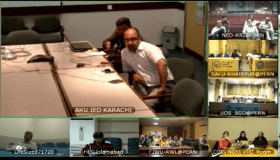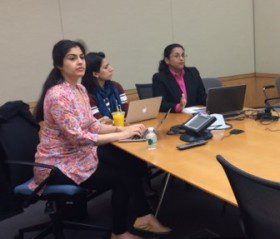“This is not an India problem, or a South Asia problem. It is global,” said Lakshmi Iyer, Associate Professor of Business Administration at Harvard Business School at SAI’s webinar ‘Women in Politics: The Case of India.’ Iyer was referring to the fact that women comprise only 21 percent of national parliaments worldwide.
On Thursday, May 8, SAI hosted its last webinar of the semester with Professor Iyer. Using videoconference software provided by the Higher Education Commission of Pakistan (HEC), the interactive session included participation from 7 universities in South Asia, allowing students and administrators in the region to interact directly with Iyer. Questions were also submitted on social media.
Iyer’s presentation addressed two questions: Does electing women to political office make any difference? How can women’s representation in political office be increased? Based on her extensive research of the issue, Iyer explained that the answer to the first question is: Yes, electing women to political office makes a difference in many metrics. Iyer shared many statistics to support this claim, and said that this research can be applied to other disadvantaged groups, such as racial, religious and ethnic minorities.
Iyer’s research shows that electing more women to political office results in a range of policy changes and development outcomes. Particularly, she said there tends to be improvement in issues important to women, such as infant mortality and education. Another change is that giving political representation to disadvantaged groups increases their access to the criminal justice system, which means they may be more likely to report crimes.
 Throughout the presentation, Iyer drew comparisons to other countries, including the United States. Many Western nations are not necessarily doing better than South Asian countries in getting more women elected. For example, women make up only 18 percent of the US congress.
Throughout the presentation, Iyer drew comparisons to other countries, including the United States. Many Western nations are not necessarily doing better than South Asian countries in getting more women elected. For example, women make up only 18 percent of the US congress.
Iyer addressed several methods for increasing political representation of women. More than 100 countries have some form of quotas in their electoral system, but research does not show that this is necessarily the most effective method. For example, India’s Panchayati Raj required that all states comply with a 1993 constitutional amendment for implementing quotas, but many states found ways to avoid the requirement.
In some countries, for example France and Spain, Iyer said that political parties opted to pay a fine rather than putting up women candidates, or they put women in races that the candidate is expected to lose anyway. This shows that mandating quotas from the outside does not always work.
An alternative method to increase participation of women could be the “demonstration” effect, an organic process that encourages more women to get involved in politics by seeing other women win elections. When more women are elected to office, more women are also likely to consider entering politics. Iyer said that relying on just this method would take a long time, and that there needs to be other efforts to get them involved. Quotas at lower levels of government, such as party organizational positions, can help, creating a “pipeline effect.”
Iyer said that the problem for increasing women’s political representation is not a “winnability” factor; her research shows that women candidates do well once they enter the race. From 1980-2013, only 5.9 percent of India’s state legislators were women, but only 4.7 percent of election candidates were women. The problem, then, happens before voting. Not enough women are becoming candidates.
Studies show that women are much less likely to consider themselves good candidates compared to men. Women are also much less likely to be encouraged by others to run, due to a culture that sees politics as a ‘man’s field.’ Iyer ended her presentation by saying that a political career must be made more attractive and welcoming to women.
The following universities participated in the webinar: Aga Khan University, IED, Karachi, Fatima Jinnah Women University, Rawalpindi, Kinnaird College, Lahore, NED UET Karachi, Shah Abdul Latif University, Khairpur, University of Management, Lahore, and University of Sargodha, Sargodha.
Watch a recording of the full webinar.
View Iyer’s Powerpoint presentation.
A sample of the conversation on Twitter:










